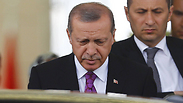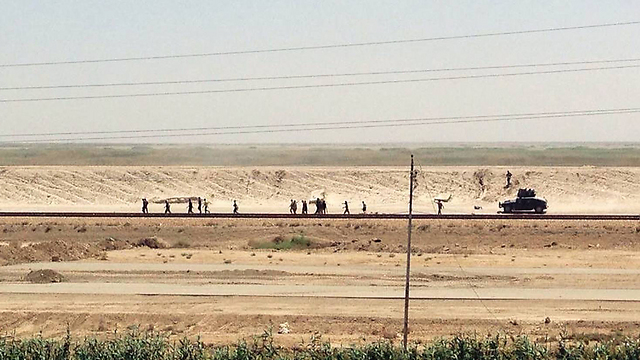
ISIS gains from Turkey's cynical policies and the West's weakness
Op-ed: Turkey turns a blind eye to jihadists entering Syria through its borders, and is not held accountable for it, while the US-led coalition misses opportunities to inflict real damage on ISIS.
Two worrisome news stories were recently published regarding the Islamic State. The first claimed that the organization is using chemical weapons against the Kurds in Syria. The second story reported that ISIS had taken hold of a city in east Libya. It seems that almost nothing can stop the spread of this murderous organization in Iraq, Syria, the northern Sinai region, and Libya.
How could this happen? Why is the West unable to stop this enemy, who presents such frightening dangers? The answer contains two parts: Turkey, and weakness.
Regarding Turkey: ISIS deals in both imports and exports, both through Turkey. The exports are of oil, ISIS’s main source of income. The imports are of fighters and volunteers, coming in from all over the world, through Turkey. In a move that’s nothing less than amazing, Turkey, a member of NATO, is openly assisting the alliance's sworn enemy.
Turkey’s cynical policy is meant to allow ISIS to oppress the Kurds, but in fact it risks much wider interests. It’s true that after a recent ISIS bombing of Kurd targets inside the country, Ankara did allow American planes to use its military bases against ISIS. However, this small gesture doesn’t change its overall policies, which remain problematic.
The second part of the answer is no less amazing – the West’s operative weakness. Militarily, ISIS is an easy enemy: It’s not a terrorist organization of the al-Qaeda variety, whose members hide among civilian population. It is a real army, operating on a large scale. It has command centers, assets, and its fighters travel in broad daylight, driving easily identifiable trucks.
A good example of ISIS’s methods was the conquering of Ramadi in Iraq a few weeks ago: Ramadi is a large city, located in a strategic point on the banks of the Tigris river, with access to the main route that leads from Iraq to Amman. Thousands of ISIS fighters drove to Ramadi during the day, in their open trucks, and easily took it from the hands of the retreating Iraqi army.
This kind of enemy should be easy pickings for any Western military capable of finding these targets and bombing them from the air. But that did not happen, since the West has not yet chosen to create a system that will efficiently handle this threat. Such a system could be built on just two foundations, both easy to implement without having to put Western boots on the ground.
The first is establishing an integrative intelligence body capable of generating targets in real time. ISIS’s methods actually make such intelligence activity easier.
The second is deciding that attacking ISIS targets in crumbling countries like Iraq, Syria and Libya (Egypt is a different story) doesn’t require any confirmation from the country in question, but can be done unilaterally inside a designated airspace.
A combination of these two, creating targets and being able to execute attacks in little time, can bring about the defeat of ISIS in not-too-long a time.
The struggle against ISIS is characterized, then, by the weakness of Western states in the face of Turkey’s actions on the one hand, and by inexplicable military helplessness on the other. It’s too bad that the West, led by the United States, is so apathetic. We should hope it doesn’t wake up only when ISIS starts conquering Europe. That will be too late.
Major-General (res.) Giora Eiland is a former head of Israel's National Security Council.











